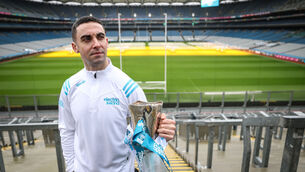Stopping Eoin Kelly...
IT was widely rumoured during the week that the evergreen Tony Browne would drop back and pick up Eoin Kelly for Waterford yesterday, but in the event it was newcomer Denis Coffey who went out to the hot corner, as they call it in American football.
His man finished with 2-9, 2-3 of which came from play.










